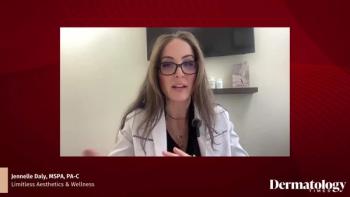
AARS on Supporting and Educating Patients with Acne
The organization is highlighting stories and resources during Acne Awareness Month through the power of social media.
During the month of June, the
“As the only national professional society dedicated to supporting research, education, and patient care for patients with acne, hidradenitis suppurativa--also known as acne inversa--and rosacea, the AARS continuously works to spread knowledge and counter misinformation about acne,” AARS President James Q. Del Rosso, DO, said in the press release.
Social Media and Misinformation
Although technological advancements such as social media allow products and professionals to reach a wider audience,
“We really need to take this disease seriously,” said AARS President-Elect Jonathan Weiss, MD, in the press release. He noted that acne,“can have a major impact on both a person’s physical being and their psyche. It is not just a cosmetic issue, but it is a serious inflammatory issue, and we have great treatments available.”
Mental Health Concerns
Members of the
Case-based Treatment
AARS notes in addition to prescription treatments there are devices, peels, and in-office treatments available to patients. Most recently, discoveries such as rehmannia glutinosa leaf extract for acne severity and improved skin hydration and a combination of surgical and non-surgical approaches have proved successful for researchers.4,5
“Scientific research and clinical trials to improve acne scars are still hot research topics in medicine. There are now many effective ways to improve acne scars. Still, each acne treatment method has its advantages and disadvantages, which can be optimized by combination therapy to achieve better results,” the authors behind the combination treatment study noted.
Background
AARS is made up of dermatology medical professionals and has a 3-part mission to:
- Facilitate the interchange of knowledge and to stimulate education among experts from varied scientific backgrounds in the areas of acne, hidradenitis suppurativa (HS), and rosacea
- Improve the care of patients who suffer from acne/HS, and rosacea
- Promote and fun acne/HS and rosacea clinical research and mentorship opportunities for dermatology healthcare professionals
The organization hosts conferences, helps fund clinical research grants, facilitates a mentorship program for future leaders and provides overall resources for the dermatology medical community.
References
- AARS spotlights personal stories during acne awareness month in June. News Release. EIN Presswire. May 28, 2024. Accesses May 30, 2024.
https://www.einpresswire.com/article/714426018/aars-spotlights-personal-stories-during-acne-awareness-month-in-june - Rieder E, Andriessen A, Cutler V, et al. Dermatology in the social media era: Building awareness of social media’s impact on adolescent skin diseases and mental health. Presented at the 2023 South Beach Symposium Meeting; February 9-12, 2023; Miami Beach, FL. Accessed May 30, 2024. https://www.livderm.org/wp-content/uploads/2023/01/MOPD-2023_Poster-psychodermatology_v3_23Jan23.pdf
- Chernyshov PV, Sampogna F, Raimondi G, et al. Development of the acne-specific quality of life questionnaire quality of life relevance-acne. JAAD Int. 2024;16:9-17. Published 2024 Mar 25. doi:10.1016/j.jdin.2024.03.007
- Study finds NuLiv Science ingredient, verbasnol, helps reduce acne severity and improves overall skin quality. News release. BioSpace. May 22, 2024. Accessed May 23, 2024.
https://www.biospace.com/article/releases/study-finds-nuliv-science-ingredient-verbasnol-helps-reduce-acne-severity-and-improves-overall-skin-quality/ - Miao L, Ma Y, Liu Z, et al. Modern techniques in addressing facial acne scars: a thorough analysis. Skin Res Technol. 2024;30(2):e13573. doi:10.1111/srt.13573
Newsletter
Like what you’re reading? Subscribe to Dermatology Times for weekly updates on therapies, innovations, and real-world practice tips.









